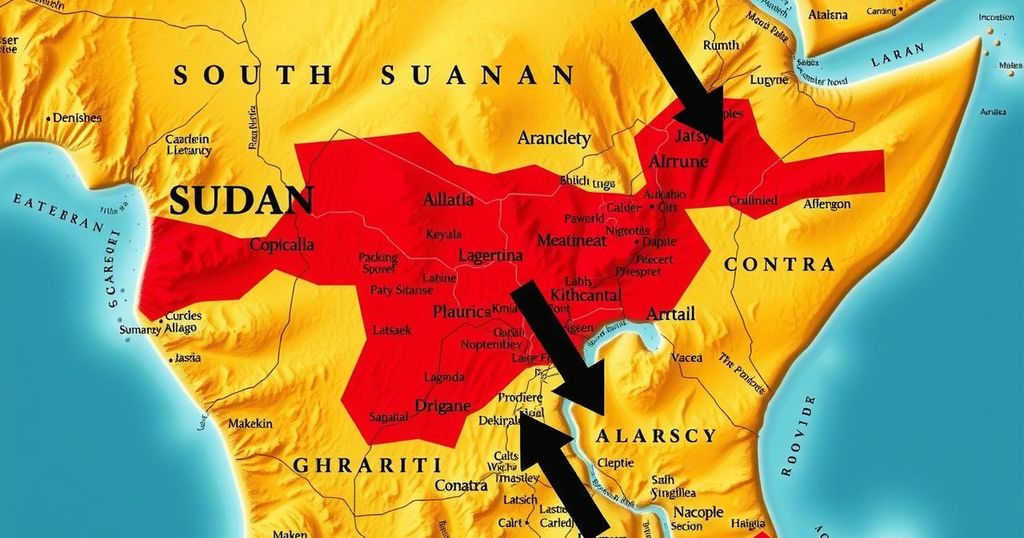World news
AFRICA, AKECH, CANADA, CIVIL WAR, DANIEL AKECH, EUROPE, IGAD, INTERGOVERNMENTAL AUTHORITY ON DEVELOPMENT, INTERNATIONAL CRISIS GROUP, KI, KIIR, MACH, MACHAR, MILITARY, NORTH AMERICA, NORWAY, REFUGEE CRISIS, RI, RIEK MACHAR, SAL, SALVA KIIR, SECURITY, SOUTH SUDAN, SUDAN, SUDANESE, UGANDA, UNITED NATIONS, WAR
Lena Nguyen
0 Comments
Renewed Tensions in South Sudan: Causes and Consequences
This article discusses the escalating tensions in South Sudan driven by increased militia violence, political strife between President Salva Kiir and First Vice President Riek Machar, and military actions that threaten peace. Concerns over a possible renewed civil conflict grow amid calls for dialogue and international intervention to stabilize the region.
Tensions in South Sudan have intensified due to rising militia violence in the Upper Nile state, cabinet reshuffles, and the arrests of high-ranking officials in Juba. Central to this unrest are President Salva Kiir and First Vice President Riek Machar, who have faced political disagreements resulting in deadly confrontations. They are part of a fragile 2018 peace agreement that concluded a civil war, during which approximately 400,000 lives were lost.
Dissatisfaction erupted when President Kiir dismissed several key government officials in February without consulting Vice President Machar, who viewed these actions as violations of the peace agreement. This led to violent protests in western Bahr al-Ghazal as angry citizens reacted to the changes. Furthermore, Kiir’s order for troop redeployments sparked violence in regions like Nasir, resulting in an attack on a UN helicopter that killed a crew member and a South Sudanese general.
The incident involving the UN helicopter has prompted condemnation from various embassies, including those of France, Canada, and Germany. In response to the escalating violence, the United States has ordered non-emergency personnel to evacuate South Sudan. According to the US Embassy, arms are easily accessible to the population and armed conflicts are ongoing among different political and ethnic groups.
To address the escalating situation, the Intergovernmental Authority on Development (IGAD) convened a summit, with Uganda deploying special forces to Juba. The commander of the Ugandan military emphasized their support for Kiir, stating, “Any move against him is a declaration of war against Uganda.” Currently, the armed forces of both leaders are positioned near Juba, creating a potentially volatile scenario.
On March 8, Yasmin Sooka, chair of the UN Commission on Human Rights in South Sudan, highlighted a troubling regression, stating, “Instead, we are witnessing an alarming regression that could erase years of hard-won progress.” More than half of the population is facing severe food insecurity, with millions displaced internally and externally.
Local civil society groups and church leaders have called for political dialogue to mitigate further conflict. Experts note that deep-rooted tensions between Kiir and Machar, which stem from the earlier civil war, exacerbate the current instability. Without trust and unity, including a comprehensive constitution, South Sudan risks sliding back into violence.
As tensions remain high and the presence of armed groups continues across South Sudan, concerns over the possibility of renewed civil war grow. The country’s ongoing instability is tied to broader regional issues, particularly the ongoing crisis in Sudan. Political scientist Abiol Lual Deng remarked that while violence is a persistent problem in South Sudan, heavy international pressure on both leaders may help avert full-scale conflict.
The renewed tensions in South Sudan stem from a combination of political discord between President Salva Kiir and First Vice President Riek Machar, military redeployments, and a breakdown of trust since the fragile peace agreement. Without significant dialogue and efforts to mitigate the situation, the potential for renewed civil war looms over the nation as underlying ethnic tensions and instability continue to persist. The situation remains precarious, requiring both domestic and international intervention to foster peace and stability.
Original Source: www.dw.com




Post Comment